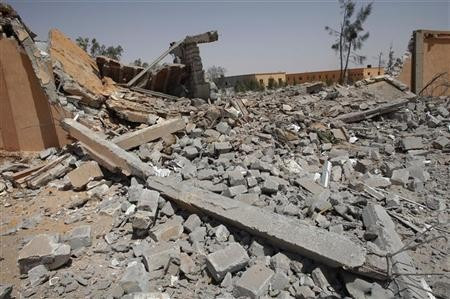Conflict in Libya: Millions Will Be Needed To Build a New Future

As Libyan rebels advance on Tripoli, civilians caught in the crossfire are fleeing for their lives.
Rebels said some 2,000 families from Zawiyah, Tripoli and other cities near the fighting on the Libyan coast passed through one checkpoint alone on Wednesday.
Reports from the capital suggested the battle has intensified with no electricity on Wednesday, and food and fuel prices have soared with people struggling to afford basic goods.
With the end of the NATO mandate looming, the rebel are attacking Muammar Gaddafis forces on several fronts.
Despite NATO and the rebels widely advertising their new advances , reports are often sketchy, with contradicting news emerging hours later, so it remains unclear how far the rebels have advanced.
U.S. officials have also proved they are willing to support the rebels by announcing they had deployed two more Predator drones for surveillance operations over Libya, as the coalition forces increases pressure on Gaddafi and his forces.
Also as rumours or more defections from the Gadhafi camp surfaced the Libyan government was forced to admit Tuesday that a senior security official had left.
Government's chief spokesman, Moussa Ibrahim, revealed that the official, Nassr al-Mabrouk Abdullah, who flew to Cairo on a private plane Monday, and at first pretended he was vacationing in the Egyptian capital with his family, had suffered "social and emotional pressures" before his defection.
The fighting on Wednesday continued in cities bordering the western mountains, including Garyan in the east and Tiji in the west while heavy fighting was also reported in Sabratha, on the coast, and Surman.
Since the beginning of the conflict, thousands of refugees have left Libya and thousands more are internally displaced people, which will make the aftermath of the conflict even harder to handle.
The country's economy has been greatly affected by the fight and both the rebels and Gaddafi have spent millions in financing and sustaining this conflict. Many more millions will now be needed to help Tripoli recover from the NATO bombardment campaign, help the IDPs return to their villages or find a new home and get the country out of the economic standstill while trying to keep inflation at a low level. Despite claims that the fight for Tripoli will be the last hurdle, many more obstacles and efforts lie ahead to turn Libya around.
© Copyright IBTimes 2025. All rights reserved.




















